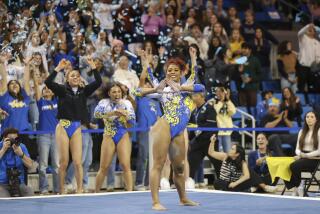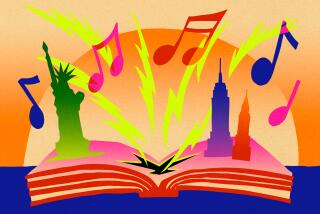Pop Weekend : Lou Reed Has Real New York Stories to Tell
- Share via
You’ve got to have a soft spot in your heart for any rock star with the audacity to begin his album with a nod to Shakespeare and close it with a toast to Andy Warhol.
Even more nervy and ambitious, Lou Reed devoted the entire first half of his commanding two-hour concert Saturday night at the Universal Amphitheatre to songs from that same album, “New York.”
It may not sound like a revolutionary move to play 11 (of the record’s 14) songs in exact album sequence. Performers, however, know fans respond best to old, familiar tunes, so the artists usually only include a few new songs in a show.
In going against the grain, Reed had reasons to suspect the crowd would be receptive. “New York” has been hailed by numerous critics as the album of the year so far and it is the first Reed collection in more than a decade to break into the national Top 50 sales charts.
“New York” is a sprawling work, bristling with the passion, commentary and humor of a book by Wolfe (Thomas or Tom). Forget about Allen, Coppola or Scorsese, Reed offers us the real New York stories of the ‘80s.
The album’s most striking numbers, including “Romeo Had Juliette” and “Dirty Blvd.,” are blunt, even painful portraits of people trapped without hope in a world over-run with tenements, welfare hotels and crack dealers.
Reed--wearing glasses and a black sport jacket--looked like a newsman reporting from the battle front Saturday as he stood at the microphone in front of a set consisting of a graffiti wall and huge, shattered tenement window.
In contrast to the seedy urban setting, many of the colorful neon lights near the front of the stage underscored the glamour of New York and other American cities with their messages of “dancing” and “lounge” and “grill.”
The fact that these worlds of despair and glitz can coexist in the world’s most important city apparently leads to the anger of songs such as “Last Great American Whale” and “There Is No Time”--songs that suggest the country has lost its values and will.
For all his emphasis on lyrics, Reed also brings a tailored and evocative touch to the music. “Halloween Parade”--about the tragedy of AIDS--carries a melody as beautiful as something from Stephen Foster, while there’s an urgency and fury to rhythm of “There Is No Time.”
And despite the general gloom, there is a trace of optimism, especially “Dime Store Mystery,” a song (dedicated to Warhol) that reminds us of how individuals can make a difference.
The second half of the concert was an equally tailored and passionate sample of Reed’s earlier music--both predictable numbers (“Walk on the Wild Side,” “Sweet Jane”) and some surprises (an especially inspired, jazz-tinged rendition of “One for My Baby”).
Interacting with Reed’s own guitar work, bassist Rob Wasserman, guitarist Mike Rathke and drummer Bob Medici brought a sense of vitality and desire to the music that made it seem as if the musicians were unveiling each song for the first time.
Reed--joined at the amphitheater by the Feelies--may not end up with just the year’s best album; he may also have the year’s most stylish and touching tour.
More to Read
The biggest entertainment stories
Get our big stories about Hollywood, film, television, music, arts, culture and more right in your inbox as soon as they publish.
You may occasionally receive promotional content from the Los Angeles Times.










